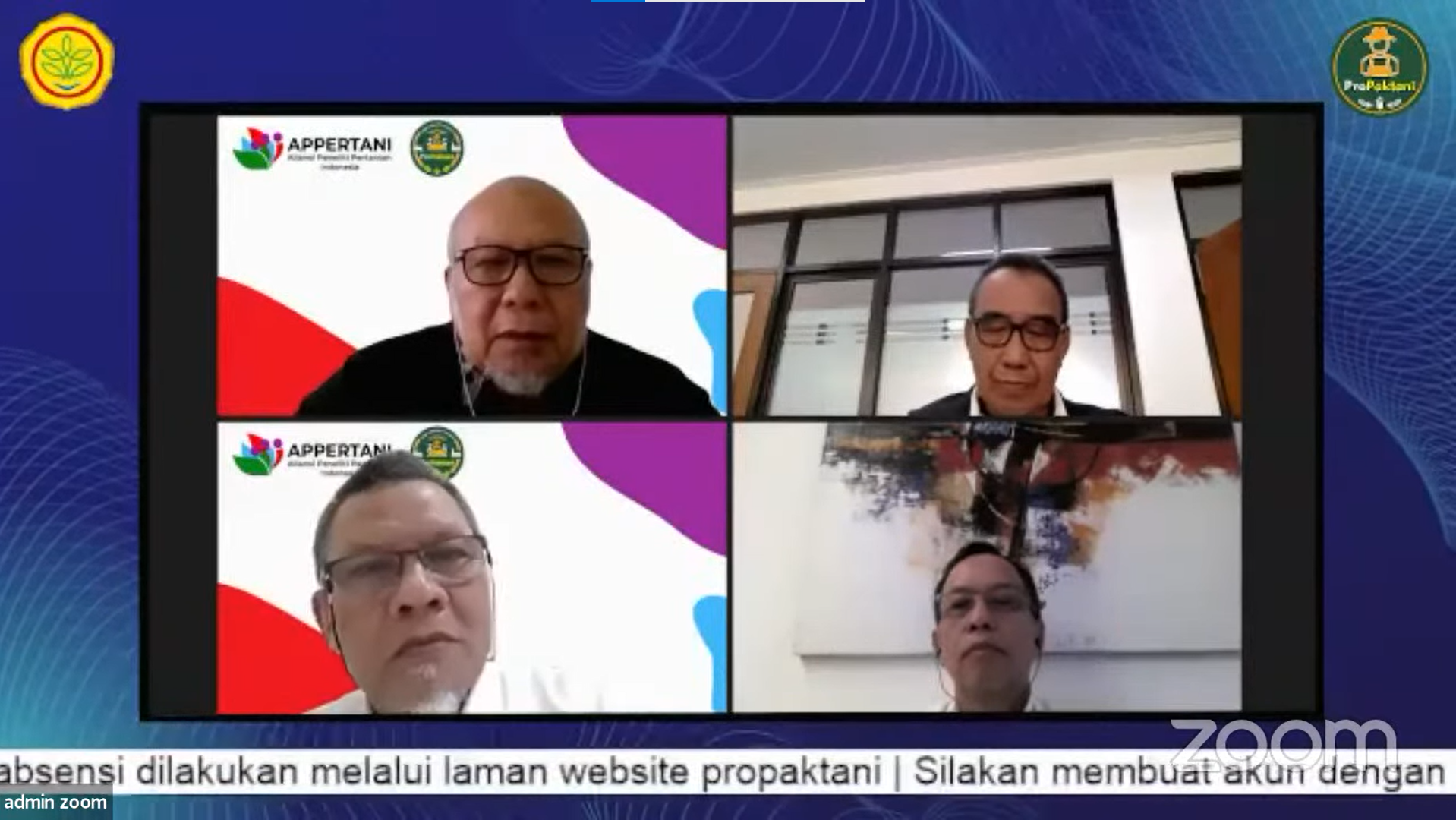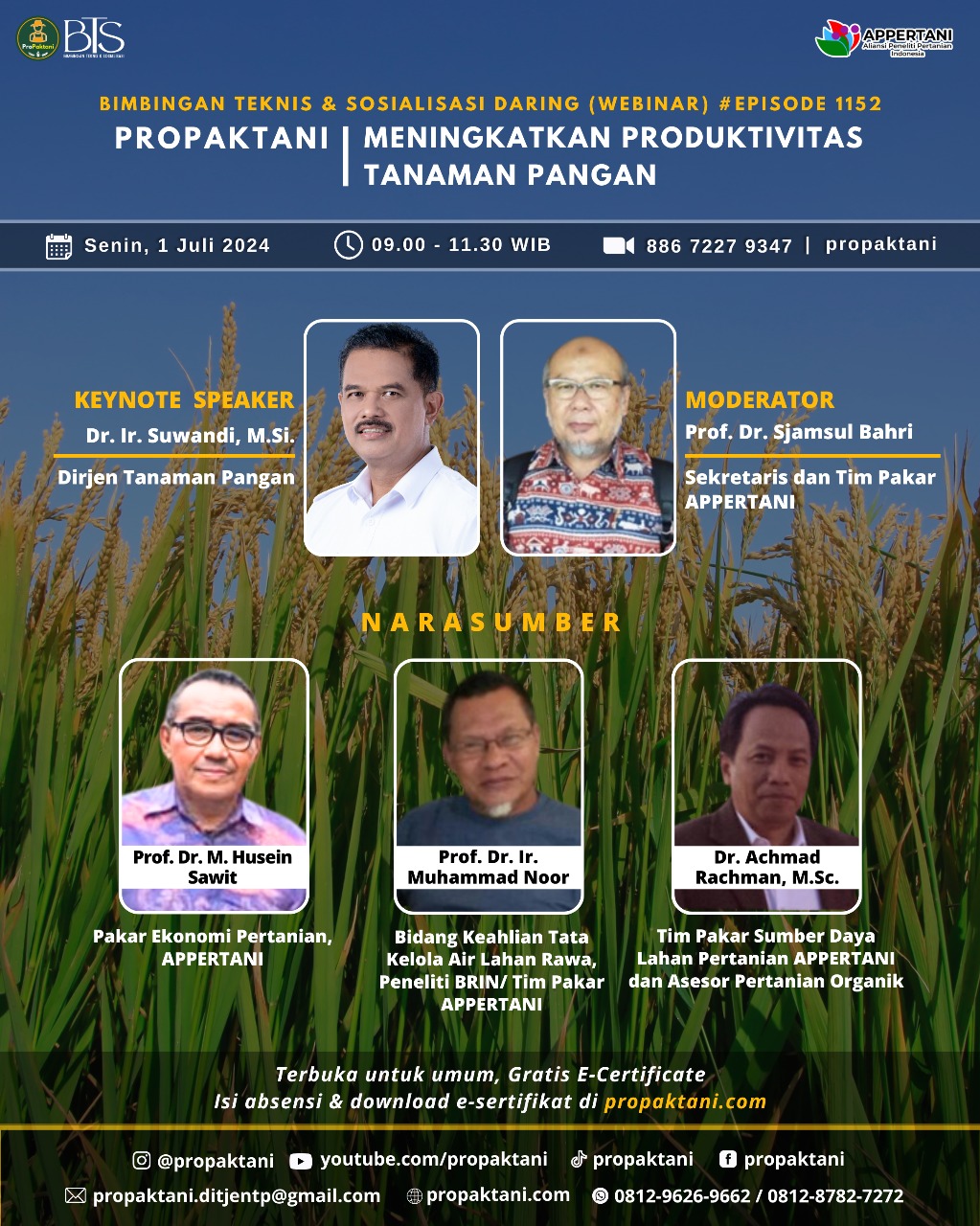Online Socialization and Technical Guidance (WEBINAR) #EPISODE 1152 PROPAKTANI

Increasing the Productivity of Food Crops
Domestic rice production in the 2018-2023 period decreased by -1.91%, while domestic demand continues to increase in tandem with the increase in the number of populations, relatively high consumption amid the negative impact of climate change. The decline in production is due to the reduction of harvest acreage and the decrease in productivity. Dr. Suwandi, Director General of Food Crops in his keynote speech informed that the Ministry of Agriculture is trying to expand the planting area by utilizing swampland and pumping, as well as increasing productivity by using high-yield potential seeds, mechanization and cultivation of good agricultural practices (GAP). Propaktani episode 1152 organized by APPERTANI discussed the topic: Increasing Food Crops Productivity through efforts to increase productivity, expand planting areas on swampland and diversify food. The moderator of this webinar episode was Prof. Dr. Sjamsul Bahri, Secretary who is also the APPERTANI Expert Team.

Prof. Dr. M. Husein Sawit, APPERTANI Agricultural Economics Expert delivered the topic: “Rice Seeding and Milling in an Effort to Increase Rice Productivity, Rice Production and Quality”, discussed rice productivity and production, as well as rice quality. Rice productivity is affected using new superior varieties of quality seeds. The speed of superior varieties assembly is getting slower after the merger of the R&D function from the Ministry of Agriculture to BRIN, even though superior varieties. must be replaced in 5-10 years. Private seed companies, State-Owned Enterprises (SOEs) and small-scale seed breeders will find it increasingly difficult to obtain source seeds from breeders, so many rely on high-quality seeds that are at high risk for achieving self-sufficiency in the future. In addition to climate change, it is an environmental condition that greatly affects the actualization of the potential yield of superior varieties. The national rice industry is supported by a weak post-harvest industry, most of which are Small-Scale Mills, causing large crop losses, equivalent to 2.8 million tons of rice, and unable to meet consumer rice preferences. It is suggested that a form of cooperation should be designed so that Small-Scale Mills rice products are used as an input between Large-Scale Milling, not scrambling to absorb farmers’ grain so as not to kill the PPK and not make the price of grain volatile.

Prof. Dr. Ir. Muhammad Noer, MS. BRIN researchers and the APPERTANI Expert Team in the Field of Swampland Water Management delivered material with the following topic: “Discourse on Water Management in Rice Cultivation in Swampland”. The swamp land available for agriculture is 7.5 million ha out of a potential of 19.1 million ha, while the functional one is only 1.8 million ha. Swampland management technology continues to develop, but its implementation has not been fully successful. Swampland water management is very important to solve the problem of drought and seawater intrusion in the dry season as well as saltiness and poisoning in the rainy and dry seasons. Water management and land arrangement according to land typology greatly determine the success of plant cultivation in swamp land, in addition to planting patterns, planting systems, mechanization, swamp soil fertility management, selection of tolerant varieties. Water management in swampland requires adequate and appropriate infrastructure support and facilities. In addition, increasing rice production in swampland needs policy support and budgets both central/regional that are complete and multi-year.
Dr. Achmad Rachman, MSc, APPERTANI Expert Team for Agricultural Land Resources and Executive Director of the Indonesian Cassava Society delivered material on the topic: “Increasing Cassava Production and Industrial Development”. Rice imports to meet the government’s rice reserves has reached to 3 million tons in 2023, amid drought conditions in most parts of Indonesia and restrictions on rice exports by rice-producing countries such as India. Food diversification based on local wisdom is very urgent to reduce rice consumption. Cassava has advantages as a source of carbohydrates such as wide adaptation, low business investment, climate change ready, high nutrient efficiency, derivative products with high economic value and a healthy food source because it has a low glycemic index. Indonesia as the second cassava producing country in ASEAN after Thailand and the 4th cassava producer in the world after Nigeria, Congo and Thailand need to optimize the advantages of cassava.

